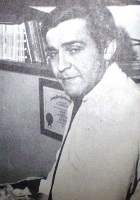Francisco Urondo
Francisco Urondo Poems
I have heard the winter sun. It grows casting layers, tightly around its heart; it shakes its sleep, unfurls the feather coat it wears: looks on as shapes of its idols fall one by one away.
...
I am left with only a few friends and those here
are usually far and I am left
an aftertaste I keep within close reach
...
Going forth, the mud comes up to our hips, calming
some uncertainties, giving rise to others. We move
around new pools.
...
A washbowl has shown me
the face of my future. There are no complications
or demons past my exhaustion, no consular
...
All I ask is that we leave this park,
its munitions, its reproaches for our going there
as if we wore too-amusing masks
...
My grandfather had a good heart
and some men, competent.
He had a pair of bodyguards
...
It seems a lie
that I'm to blame for everything
that has happened in the world
...
Dreams make the freed gulls visible. With the bone of your eyes-it's your heart that burns, behind, along with the scrublands.
...
The balconies of the Aranjuez, the silks
that come to rest on the green river: I stretch myself
like a column and enter your underskirts, fan
...
Poets were always, effectively, men
of transition, Roberto
Fernández Retamar; because really, my friend, if a poet
...
Francisco Urondo Biography
Francisco "Paco" Urondo was an Argentine writer and member of the Montoneros guerrilla organization. Urondo published multiple collections of poetry, short stories, theatrical works, and a novel, as well as La patria fusilada, his famous interview with the survivors of the massacre at Trelew, and his critical essay "Veinte años de poesía argentina." Urondo also collaborated in the writing of movie scripts such as Pajarito Gómez (which includes a cameo appearance) and Noche terrible, and adapted for television Flaubert's Madame Bovary, Stendhal's Le Rouge et le Noir, and Eça de Queiroz's Os Maias. In 1968 he was named General Culture Director for the Santa Fe Province, and in 1973 Director of the Literature Department of the Faculty of Philosophy and Literature of the University of Buenos Aires. As a journalist, he collaborated in several national and international media, among them Primera Plana, Panorama, Crisis, La Opiníon and Noticias. At 18, Urondo left home to study chemistry, then law, and then philosophy and letters, but none of these satisfied him. He abandoned academics and went to Buenos Aires where he led a thriving social life and was known among his friends for his lively and intellectual personality. He practiced puppeteering there for a short while. His writing career developed with the production of his first collections, La Perichole and Historia Antigua, in the 1950s. Too, his militancy grew, first with his participation in the Argentine guerrilla organization FAR, and later the Montoneros. For Urondo, his writing and his militancy were inseparable, despite a mutual mistrust among the two groups. Juan Gelman, a fellow poet and friend, remembers Urondo as saying once that he “took up arms because he was looking for the right word.” Along with Gelman and poets Roque Dalton and Mario Benedetti, Urondo developed a conversational style of writing in the 60s and 70s simultaneous with the increasingly strained dynamic between the corrupt state and its people. They wrote with frankness and accusation, resisting collective silence by exposing difficult social and political truths—though devoting their words to art and lyricism above all else. Urondo was imprisoned in 1973 but released; that same year, he published La Patria Fusilada which recounts through interview the stories of the three survivors of the Trelew massacre. Due to his militancy Urondo had to enter into a clandestine life, taking great pains to disguise himself in public and adopting a pseudonym, Ortiz, after Juan L. Ortiz. He was aware of the danger he was in and had obtained cyanide pills for himself so that, in the event of a compromise, he would not be taken and tortured and forced to betray his friends. Though he held a position of responsibility within the Montoneros, in 1976 Urondo found himself demoted for internal political reasons and had to be transferred. He asked to not be sent to Santa Fe or to Mendoza because he was well known in both places, but nevertheless they placed him as head of the Mendoza column. Out of options, Urondo left for Mendoza in the beginning of May, 1976 with his then-companion Alicia Raboy and their one-year-old child Angela.)
The Best Poem Of Francisco Urondo
Days Come and Gone
I have heard the winter sun. It grows casting layers, tightly around its heart; it shakes its sleep, unfurls the feather coat it wears: looks on as shapes of its idols fall one by one away.
The warmth won't destroy it fully, the cold won't break the dream. It is wounded, though, by time that contains it, by cruelty, decision, by great docks in wait, eternal beginnings, measured goodbyes.
translated from the Spanish by Julia Leverone
